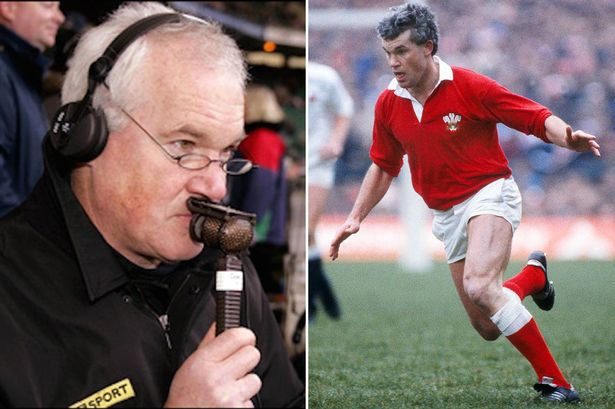Simply The Best
- Sep 18, 2022
- 3 min read
Updated: Dec 21, 2022
Mid December 1974. Along with my high school teammates, we arrive in Monmouth, a Welsh town situated at the junction of the Monnow and Wye rivers. Just two miles from the border with England.

We prepare to play vs Monmouth School, the third of our six tour matches. The institution, founded back in 1614, sports a long and proud rugby union tradition.
Kickoff approaches. Captain for the day, I meet the referee to conduct the coin toss. The opposition skipper, an imposing figure in his chocolate brown jersey, is there as well. He stares me down. His fame proceeds him, a raw boned 6’4”, 210-pound back row forward already also playing to great effect at elite senior men’s level.
Soon, the game gets underway. Best suited to a fast tempo, a firm field, and a dry ball, we struggle to manage the wet, muddy conditions. Our lack of size presents a whole range of problems, as the home pack drives on relentlessly.
Inevitably, I find myself directly in the firing line. From a midfield scrum, the Monmouth captain picks up the ball and charges forward. Utterly dominant, legs and arms pumping like pistons, he is a fearsome sight. He swats me aside and, though I cling on desperately, slips a pass to a support runner. Seconds later the hosts cross for yet another try.
Eventually, the one-way traffic ends. We battle hard for the full 70 minutes, but the scoreboard does not lie. Monmouth 33, Shawnigan 3.
If the home captain impresses hugely on the field, he does likewise at the after-match gathering. The game is one sided, but he is never condescending in his comments. Instead, well spoken, he displays humour, modesty, and humility, wishing us well in our remaining games.
Once back in Canada, on Vancouver Island, on completion of grade 12, my athletic focus shifts to basketball. Yet, a love affair with all things rugby continues. I make a mental note to follow the progress of the Monmouth star performer.

Over the course of the next few years, I learn a lot. He attends Cambridge to study languages, while winning "Blues" for playing in three consecutive Varsity matches vs Oxford. Returning to Wales, he then joins Pontypool RFC, quickly rising to prominence as one of a rugged, brutally hard-nosed, sometimes violent group of forwards.
International honours soon follow, as, just 22, he wins a first test cap in 1980. He goes on to represent Wales sixteen times, six as captain. He tours New Zealand with the British Lions in 1983 and represents the famous Barbarians RFC.
Alas, after the spectacular successes of the 1970s, the early 1980s prove to be an indifferent era for the Welsh team. A number of mid table Five Nations finishes are then followed by a shocking away defeat to unfancied Romania. Frustrated, in 1985 he retires.

Still, as one door closes, others open.
Hugely talented, he turns to the spoken and written word. In order, he becomes an accomplished journalist, a published author, a much-read newspaper columnist, and a celebrated radio and TV broadcaster.
In this latter role, he joins the legendary Bill McLaren in describing major rugby matches. After McLaren’s retirement in 2002 he takes over as the BBC’s lead commentator. Used to the non-stop blather of North American sport play by play and analysis, I appreciate his economy of words, his exceptional command of the English language, his role as a storyteller of sorts, his deep knowledge. How he would let a game breathe.

Thus, it is a shock to read a few days ago of his untimely and unexpected death at the age of 65. My age.
Part of a Prostate Cancer charity trek, he passes away peacefully in his sleep, at base camp on the Inca Trail in the Peruvian Andes.
Glowing tributes immediately pour in from all across the globe. Countless people full of praise for his outstanding contributions to journalism and broadcasting. Others comment favourably on his splendid playing career, his generous charity work, his passionate support of Welsh independence.
Indeed, he could literally do it all. Who else could captain their country at rugby, tour with the Lions, and then become a world-renowned pundit and correspondent? With many other strings to their bow.
So, alone with my thoughts, my mind traces back once again nearly half a century. To a soggy pitch in east Wales.
To the brief encounter with a rampant, intimidating Monmouth #8 who dominates the action. To a wonderful player. To a natural leader.
And, later, to one whose lyrical tones and soothing, liquid, television voiceovers pay homage to famous sporting moments and to legends of the game.
To a poet, whose rich baritone voice serves rugby so eloquently for decades.
He is Eddie Butler. Simply the best.
RIP.




Comments